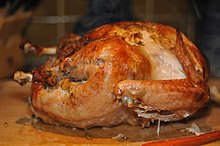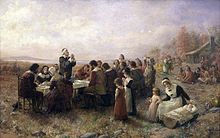
To you and yours--a blessed day!
Thanksgiving Day is a national holiday celebrated in Canada and the United States. It was originally celebrated as a day of giving thanks for the blessing of the harvest and of the preceding year. Thanksgiving is celebrated on the second Monday of October in Canada and on the fourth Thursday of November in the United States. Several other places around the world observe similar celebrations. Although Thanksgiving has historical roots in religious and cultural traditions, it has long been celebrated in a secular manner as well.
History
Prayers of thanks and special thanksgiving ceremonies are common among almost all religions after harvests and at other times.
[1] The Thanksgiving holiday's history in North America is rooted in English traditions dating from the Protestant
Reformation. It also has aspects of a
harvest festival, even though the harvest in
New England occurs well before the late-November date on which the modern Thanksgiving holiday is celebrated.
[1][2]
In the English tradition, days of thanksgiving and special thanksgiving religious services became important during the
English Reformation in the reign of
Henry VIIIand in reaction to the large number of religious holidays on the Catholic calendar. Before 1536 there were 95 Church holidays, plus 52 Sundays, when people were required to attend church and forego work and sometimes pay for expensive celebrations. The 1536 reforms reduced the number of Church holidays to 27, but some
Puritans wished to completely eliminate all Church holidays, including
Christmas and
Easter. The holidays were to be replaced by specially called
Days of Fasting or Days of Thanksgiving, in response to events that the Puritans viewed as acts of
special providence. Unexpected disasters or threats of judgement from on high called for Days of Fasting. Special blessings, viewed as coming from God, called for Days of Thanksgiving. For example, Days of Fasting were called on account of drought in 1611, floods in 1613, and plagues in 1604 and 1622. Days of Thanksgiving were called following the victory over the
Spanish Armada in 1588 and following the deliverance of
Queen Annein 1705. An unusual annual Day of Thanksgiving began in 1606 following the failure of the
Gunpowder Plot in 1605 and developed into
Guy Fawkes Day.
[3]
In Canada
While some researchers state that "there is no compelling narrative of the origins of the Canadian Thanksgiving day",
[4] the first Canadian Thanksgiving is often traced back to 1578 and the explorer
Martin Frobisher. Frobisher, who had been trying to find a
northern passage to the Pacific Ocean, held his Thanksgiving celebration not for harvest but in thanks for surviving the long journey from England through the perils of storms and icebergs. On his third and final voyage to the far north, Frobisher held a formal ceremony in
Frobisher Bay in
Baffin Island (present-day
Nunavut) to give thanks to God and in a service ministered by the preacher
Robert Wolfall they celebrated Communion.
[5]
The origins of Canadian Thanksgiving are also sometimes traced to the French settlers who came to
New France with explorer
Samuel de Champlain in the early 17th century, who celebrated their successful harvests. The French settlers in the area typically had feasts at the end of the harvest season and continued throughout the winter season, even sharing food with the
indigenous peoples of the area.
[6]
As settlers arrived in Canada from New England, late autumn Thanksgiving celebrations became commonplace. New immigrants into the country—such as the Irish, Scottish, and Germans—also added their own traditions to the harvest celebrations. Most of the US aspects of Thanksgiving (such as the turkey), were incorporated when
United Empire Loyalists began to flee from the United States during the
American Revolution and settled in Canada.
[6]
In the United States
In the United States, the modern Thanksgiving holiday tradition is commonly, but not universally, traced to a sparsely documented 1621 celebration at
Plymouth in present-day
Massachusetts. The 1621 Plymouth feast and thanksgiving was prompted by a good harvest.
Pilgrims and
Puritans who began emigrating from England in the 1620s and 1630s carried the tradition of Days of Fasting and Days of Thanksgiving with them to
New England. Several days of Thanksgiving were held in early New England history that have been identified as the "First Thanksgiving", including Pilgrim holidays in
Plymouth in 1621 and 1623, and a Puritan holiday in
Boston in 1631.
[8][9] According to historian Jeremy Bangs, director of the
Leiden American Pilgrim Museum, the Pilgrims may have been influenced by watching the annual services of Thanksgiving for the relief of the
siege of Leiden in 1574, while they were staying in Leiden.
[10] Now called
Oktober Feesten, Leiden's autumn thanksgiving celebration in 1617 was the occasion for sectarian disturbance that appears to have accelerated the pilgrims' plans to emigrate to America.
[11] Later in Massachusetts, religious thanksgiving services were declared by civil leaders such as
Governor Bradford, who planned the colony's thanksgiving celebration and fast in 1623.
[12][13][14]The practice of holding an annual harvest festival did not become a regular affair in New England until the late 1660s.
[15]
Thanksgiving proclamations were made mostly by church leaders in New England up until 1682, and then by both state and church leaders until after the
American Revolution. During the revolutionary period, political influences affected the issuance of Thanksgiving proclamations. Various proclamations were made by royal governors,
John Hancock, General
George Washington, and the
Continental Congress,
[16] each giving thanks to God for events favorable to their causes.
[17] As President of the United States, George Washington proclaimed the first nationwide thanksgiving celebration in America marking November 26, 1789, "as a day of public thanksgiving and prayer to be observed by acknowledging with grateful hearts the many and signal favours of Almighty God".
[18]
In modern times the President of the United States, in addition to issuing a proclamation, will
"pardon" a turkey, which spares the bird's life and ensures that it will spend the duration of its life roaming freely on farmland.
[19]
Debate about first celebrations in the United States
The traditional representation of where the first Thanksgiving was held in the United States has often been a subject of
boosterism and debate, though the debate is often confused by mixing up the ideas of a Thanksgiving holiday celebration and a Thanksgiving religious service. According to author James Baker, this debate is a "tempest in a beanpot" and "marvelous nonsense".
[8]
Local boosters in Virginia, Florida, and Texas promote their own colonists, who (like many people getting off a boat) gave thanks for setting foot again on dry land. (Jeremy Bangs
[10])
According to Baker, "Historically, none of these had any influence over the evolution of the modern United States holiday. The American holiday's true origin was the New England
Calvinist Thanksgiving. Never coupled with a Sabbath meeting, the Puritan observances were special days set aside during the week for thanksgiving and praise in response to God's providence."
[8]














